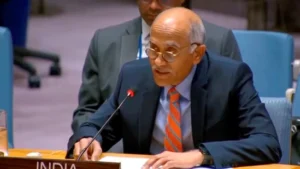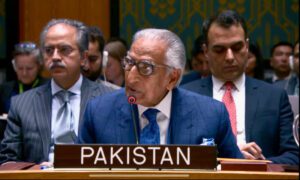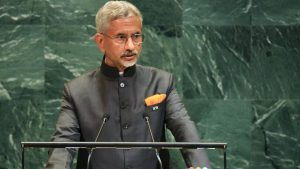New Delhi – India delivered a scathing rebuttal to Pakistan at the United Nations Security Council during a critical debate on women peace security, exposing Islamabad’s historical atrocities against women while challenging its attempts to misrepresent the situation in Jammu and Kashmir. The exchange highlighted Pakistan’s documented record of systematic violence against women, particularly during the 1971 Operation Searchlight genocide in Bangladesh.
India’s Strong Response at Women Peace Security Debate

During the UNSC women peace security debate, India’s Permanent Representative to the United Nations, Parvathaneni Harish, characterized Pakistan’s statements as a “delusional tirade” against India, particularly concerning Jammu and Kashmir. The Indian diplomat emphasized the annual pattern of Pakistan misusing international forums to make unfounded allegations about Indian territory.
“Every year, we are unfortunately fated to listen to the delusional tirade of Pakistan against my country, especially on Jammu and Kashmir, the Indian territory they covet,” Harish stated during the women peace security discussion. His remarks underscored India’s frustration with Pakistan’s consistent attempts to internationalize bilateral issues while ignoring its own documented violations of women’s rights.
Pakistan’s Allegations on Kashmiri Women


Pakistan’s Counsellor Saima Saleem, representing the Permanent Mission to the United Nations, used the women peace security platform to discuss what she termed the “plight” of Kashmiri women. Saleem alleged that Kashmiri women had endured “decades of occupation” involving sexual violence deployed as a weapon of war, directly challenging India’s sovereignty over the territory.
Saleem cited various international organizations’ reports during the women peace security debate, including documentation from the UN Office of the High Commissioner for Human Rights, Special Procedures, Amnesty International, Human Rights Watch, and Médecins Sans Frontières. She listed alleged violations including structural impunity, harassment of women human rights defenders and journalists, reprisals against female family members of disappeared persons, torture, arbitrary detentions, and trauma from sexual violence.
India Exposes Operation Searchlight Atrocities


In response to Pakistan’s allegations during the women peace security debate, Harish highlighted Pakistan’s documented historical violations of women’s rights, specifically referencing Operation Searchlight. The Indian diplomat accused Pakistan of “misdirecting the world with hyperbole” while possessing one of the worst records of violence against women in modern history.
“This is a country that conducted Operation Searchlight in 1971 and sanctioned a systematic campaign of genocidal mass rape of 400,000 women citizens by its own army. The world sees through Pakistan’s propaganda,” Harish declared during the women peace security discussion, drawing attention to Pakistan’s hypocrisy in raising women’s rights issues.
Also Read: Latest Update: India Russia Negotiate 5 More S-400 Systems to Strengthen Air Defence
Historical Context: Operation Searchlight Genocide
Operation Searchlight was a military operation conducted by the Pakistani Army aimed at suppressing the Bengali nationalist movement in East Pakistan, which later became Bangladesh. The campaign resulted in horrific atrocities against Bengali civilians, particularly women, representing one of history’s most systematic instances of sexual violence during conflict.
Between 300,000 and 3,000,000 Bengali people were killed by Pakistani forces during the operation. Most significantly for the women peace security debate context, approximately 400,000 Bengali women were raped as part of this campaign of mass murder and genocidal sexual violence. These documented atrocities represent one of the largest systematic sexual violence campaigns in modern history.
The ethnic cleansing during Operation Searchlight prompted Indian intervention as 10 million Bengali refugees fled to India. The events from March to April 1971 ultimately triggered the Liberation War, which saw East Pakistan separate and emerge as independent Bangladesh. These historical facts provided crucial context to India’s response during the women peace security debate.
Pakistan’s Demand for Kashmir Inclusion
During the women peace security debate, Saleem argued for including Kashmiri women in the Women, Peace and Security agenda, claiming their exclusion “erases its legitimacy and undermines its universality.” She emphasized that the Jammu and Kashmir dispute remains on the Security Council’s agenda, demanding that future reports reflect what she characterized as Kashmiri women’s plight.
This demand attempted to leverage the women peace security framework to internationalize the Kashmir issue, a strategy India firmly rejected as misusing humanitarian concerns for political objectives.
UNSC Women Peace Security Resolution Anniversary
The women peace security debate marked the 25th anniversary of UN Resolution 1325, adopted in 2000. This landmark resolution recognized the disproportionate and unique impact of armed conflict on women and girls, establishing frameworks for preventing violations of women’s rights during conflicts.
The women peace security resolution focuses particularly on prevention of rights violations during armed conflicts, making it a significant milestone in international humanitarian law. However, India’s response highlighted how some nations misuse such forums to advance political agendas while ignoring their own documented violations.
Recent India-Pakistan UN Exchanges
The women peace security debate exchange follows India’s September rebuke of Pakistan Prime Minister Shehbaz Sharif’s UN General Assembly speech. Sharif had presented what India characterized as misdirected facts regarding Operation Sindoor and claimed Pakistani victory during the May standoff between the two countries.
Operation Sindoor was India’s military response to the April 22 Pahalgam terror attack in Jammu and Kashmir, involving strikes on terror bases across Pakistan and Pakistan-occupied Kashmir. The operation demonstrated India’s commitment to counterterrorism despite Pakistani attempts to portray themselves as victims.
Conclusion: Exposing Hypocrisy
India’s response during the women peace security debate effectively exposed Pakistan’s hypocrisy in raising women’s rights concerns while possessing documented history of systematic violence against women. By highlighting Operation Searchlight’s genocidal sexual violence, India demonstrated how Pakistan misuses international humanitarian forums while ignoring its own atrocities, undermining legitimate women peace security discussions with political propaganda.

